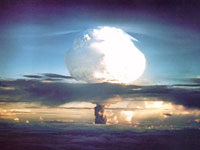Israeli intelligence says, Iran is still trying to develop nuclear weapon
Israeli intelligence does not believe that Iran stoped trying to develop a nuclear weapon, Israel's defense minister said Tuesday, disputing a U.S. intelligence assessment that Iran has halted its program.

"It's apparently true that in 2003 Iran stopped pursuing its military nuclear program for a time. But in our opinion, since then it has apparently continued that program," Defense Minister Ehud Barak told Army Radio.
In a new assessment made public on Monday, the U.S. National Intelligence Estimate on Iran, a synthesis of information from American spy agencies, concluded that Iran has suspended its attempt to build a nuclear weapon. The unclassified summary marked a surprising reversal of the previous U.S. view that Iran is aggressively pursuing a nuclear weapons program.
Israeli Prime Minister Ehud Olmert stopped short of disputing the U.S. assessment on Tuesday, playing down the new gap between the Israeli and American views.
"According to this report, and to the American position, it is vital to continue efforts to prevent Iran from attaining (nuclear) capability," Olmert told reporters before meeting with Italy's deputy prime minister.
In his interview Tuesday, Barak said, "There are differences in the assessments of different organizations in the world about this, and only time will tell who is right."
Barak, head of Israel's centrist Labor Party, is a former Israeli army chief of staff and a former prime minister.
Iran says its nuclear program is peaceful. But Israel believes the program's goal is to create a nuclear weapon, a real concern for the Jewish state because of the bitter enmity between the two countries.
Iran funds Islamic groups like Hezbollah and Hamas, both openly dedicated to Israel's destruction, and Iranian President Mahmoud Ahmadinejad has said Israel should be "wiped off the map."
Israel has backed U.S.-led efforts at the United Nations to impose sanctions on Iran for its refusal to halt uranium enrichment activities - a process that can be used to develop nuclear arms. Israel has not ruled out military action against Iran, but says it prefers a diplomatic solution to the standoff.
Asked if the new U.S. assessment reduced chances that the U.S. will launch a military strike on Iran, Barak said that was "possible."
However, he said, "We cannot allow ourselves to rest just because of an intelligence report from the other side of the earth, even if it is from our greatest friend."
Not only does Israeli intelligence believe Iran is still pursuing a nuclear bomb, defense officials said this week, the Israelis are worried about the possibility that Iran might have already received ready-made nuclear material from North Korea, dramatically speeding up the process.
The officials spoke on condition of anonymity because of the sensitivity of the subject.
In September, Israeli warplanes attacked a military target in Syria, a close Iranian ally. Foreign experts believe the installation was a nuclear facility built with North Korean assistance. Syria and North Korea have denied the charge.
The new U.S. assessment says Iran continues to enrich uranium, and could still manufacture a nuclear weapon sometime between 2010 and 2015.
"Tehran's decision to halt its nuclear weapons program suggests it is less determined to develop nuclear weapons than we have been judging since 2005," said the report.
The report seemed likely to embolden those who oppose military action against Iran and say President George W. Bush has overstated the threat posed by the Islamic regime in Tehran.
Meir Javedanfar, a Tel Aviv-based Iran analyst, said Tuesday that the U.S. might have been tricked.
"The Americans are basically saying that their information on Iran is better than what Israel has," Javedanfar said. "But it can never be discounted that the Americans are victims of a very clever Iranian disinformation campaign - they are very good at this."
But all residents of the Middle East should hope U.S. intelligence got it right, Javedanfar said.
"They got it wrong in Iraq, and if they get it wrong regarding Iran, then I think the implications are going to be even worse," he said.
Subscribe to Pravda.Ru Telegram channel, Facebook, RSS!



